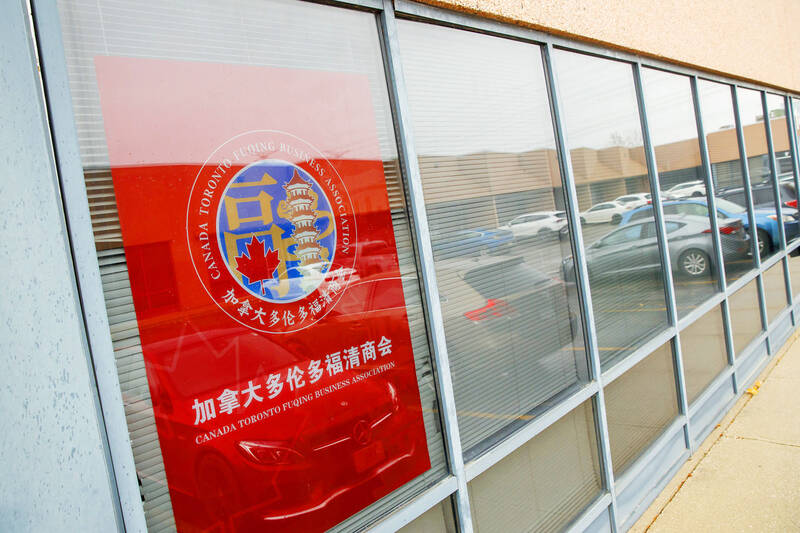The US is deeply concerned about the Chinese government setting up unauthorized “police stations” in US cities to possibly pursue influence operations, FBI Director Christopher Wray told US lawmakers on Thursday.
European human rights organization Safeguard Defenders in September published a report revealing the presence of dozens of Chinese police “service stations” in major cities around the world, including New York.
Republicans in the US Congress have requested answers from the administration of US President Joe Biden about their influence.

Photo: AP
The report said the stations were an extension of Beijing’s efforts to pressure some Chinese nationals or their relatives abroad to return to China to face criminal charges. It also linked them to activities of the Chinese Communist Party Central Committee’s United Front Work Department, a body charged with spreading its influence and propaganda overseas.
“I’m very concerned about this. We are aware of the existence of these stations,” Wray told a US Senate Homeland Security and Governmental Affairs Committee hearing, acknowledging but declining to detail the FBI’s investigative work on the issue.
“But to me, it is outrageous to think that the Chinese police would attempt to set up shop, you know, in New York, let’s say, without proper coordination. It violates sovereignty and circumvents standard judicial and law enforcement cooperation processes,” he said
Asked by US Senator Rick Scott if such stations breached US law, Wray said the FBI was “looking into the legal parameters.”
Republicans in the US House of Representatives, including US representatives Greg Murphy and Mike Waltz, last month sent letters to the US Department of Justice asking if the Biden administration was investigating such stations.
The facilities could be used to intimidate US residents of Chinese origin, the letters said.
Such stations have also been a widely reported concern in Canada and other parts of the world.
Earlier this month, the Chinese Ministry of Foreign Affairs denied it had such stations in the Netherlands after a probe by Dutch authorities.
China said they were offices to help Chinese citizens renew documents.
Wray said Washington had made a number of indictments involving the Chinese government harassing, stalking, surveilling and blackmailing people in the US who disagreed with policies implemented by Chinese President Xi Jinping (習近平).
“It’s a real problem and something that we’re talking with our foreign partners about, as well, because we’re not the only country where this has occurred,” Wray said.
The US last month unsealed criminal charges against seven Chinese nationals accused of waging a surveillance and harassment campaign against a US resident and his family in a bid by the Chinese government to repatriate one of them back to China.
It was the latest case by the justice department targeting China’s effort to track down people overseas who Beijing calls criminal suspects, known as “Operation Fox Hunt.”

PREPAREDNESS: Given the difficulty of importing ammunition during wartime, the Ministry of National Defense said it would prioritize ‘coproduction’ partnerships A newly formed unit of the Marine Corps tasked with land-based security operations has recently replaced its aging, domestically produced rifles with more advanced, US-made M4A1 rifles, a source said yesterday. The unnamed source familiar with the matter said the First Security Battalion of the Marine Corps’ Air Defense and Base Guard Group has replaced its older T65K2 rifles, which have been in service since the late 1980s, with the newly received M4A1s. The source did not say exactly when the upgrade took place or how many M4A1s were issued to the battalion. The confirmation came after Chinese-language media reported

A Ministry of Foreign Affairs official yesterday said that a delegation that visited China for an APEC meeting did not receive any kind of treatment that downgraded Taiwan’s sovereignty. Department of International Organizations Director-General Jonathan Sun (孫儉元) said that he and a group of ministry officials visited Shenzhen, China, to attend the APEC Informal Senior Officials’ Meeting last month. The trip went “smoothly and safely” for all Taiwanese delegates, as the Chinese side arranged the trip in accordance with long-standing practices, Sun said at the ministry’s weekly briefing. The Taiwanese group did not encounter any political suppression, he said. Sun made the remarks when

The Taiwanese passport ranked 33rd in a global listing of passports by convenience this month, rising three places from last month’s ranking, but matching its position in January last year. The Henley Passport Index, an international ranking of passports by the number of designations its holder can travel to without a visa, showed that the Taiwan passport enables holders to travel to 139 countries and territories without a visa. Singapore’s passport was ranked the most powerful with visa-free access to 192 destinations out of 227, according to the index published on Tuesday by UK-based migration investment consultancy firm Henley and Partners. Japan’s and

BROAD AGREEMENT: The two are nearing a trade deal to reduce Taiwan’s tariff to 15% and a commitment for TSMC to build five more fabs, a ‘New York Times’ report said Taiwan and the US have reached a broad consensus on a trade deal, the Executive Yuan’s Office of Trade Negotiations said yesterday, after a report said that Washington is set to reduce Taiwan’s tariff rate to 15 percent. The New York Times on Monday reported that the two nations are nearing a trade deal to reduce Taiwan’s tariff rate to 15 percent and commit Taiwan Semiconductor Manufacturing Co (TSMC, 台積電) to building at least five more facilities in the US. “The agreement, which has been under negotiation for months, is being legally scrubbed and could be announced this month,” the paper said,